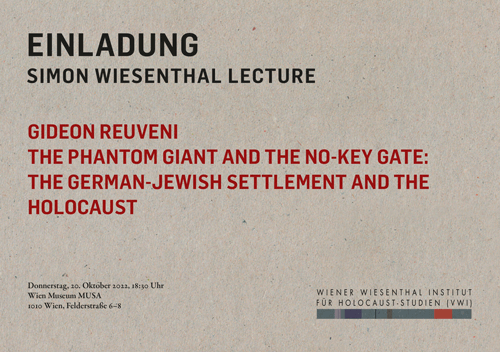Simon Wiesenthal Lectures
Die regelmäßig, alle sechs bis acht Wochen stattfindende Vortragsreihe, setzt sich zum Ziel, mithilfe renommierter Wissenschaftlerinnen und Wissenschaftler die aktuellsten Forschungsergebnisse zum Holocaust sowohl einem Fach- als auch einem breiteren Publikum zu präsentieren – und dabei das beeindruckende Spektrum dieser Disziplin, die zahlreichen Frage- und Problemstellungen von der empirisch-analytischen Historiografie bis zu kulturwissenschaftlichen Themen, jüngere Forscherinnen und Forscher ebenso wie bereits arrivierte, zu berücksichtigen.
Die Vortragsreihe der Simon Wiesenthal Lectures hat sich seit 2007, noch in der Aufbauphase des Wiener Wiesenthal Instituts für Holocaust-Studien (VWI), damals in Zusammenarbeit mit dem Dokumentationsarchiv des österreichischen Widerstandes und dem Institut für Zeitgeschichte der Universität Wien, als tragendes Element der Vermittlung neuerer wissenschaftlicher Ergebnisse im Bereich der Holocaustforschung bzw. der Holocaust- und Genozid-Studien zum Flaggschiff der Vermittlungstätigkeit des VWI entwickelt.
Über ein Jahrzehnt bot das Österreichischen Staatsarchiv im Dachfoyer des Haus-, Hof- und Staatsarchivs großzügigerweise den Simon Wiesenthal Lectures Obhut. Während den herausfordernden Jahren der Pandemie wurden die Lectures online abgehalten. Ab Herbst 2022, um weitere Publikumsgruppen zu erschließen, konnte mit dem Wien Museum eine neue Kooperationspartner gewonnen werden. Bis zur Wiedereröffnung des Hauptstandortes am Karlsplatz werden die SWL im MUSA, Felderstraße 6-8, neben dem Wiener Rathaus stattfinden.
| Simon Wiesenthal Lecture | |||
| Gideon Reuveni: The Phantom Giant And The No-Key Gate. The German-Jewish Settlement And The Holocaust | |||
Donnerstag, 20. Oktober 2022, 18:30 - 20:00 Wien Museum MUSA 1010 Wien, Felderstraße 6–8
|
|||
When on September 10, 1952, the Federal Republic of Germany, the State of Israel and the Conference on Jewish Material Claims Against Germany signed a reparation agreement in Luxembourg, this settlement was considered historical. Official publications from both sides portrayed it as a historic enterprise of a tremendous scope, unprecedented in the history of international relations just as the extermination of the Jewish people by Nazi Germany was unprecedented in human history. The agreement was to play a crucial role for the education of the German people and as a historic precedent for the whole world. It set an example and contained a warning: crimes of genocide cannot go unpunished and the moral debt arising therefrom must be paid. However, what for a brief period of time was regarded as a momentous event in post-war history was promptly pushed to the margins of the historical stage. This talk will explore why that happened. The discussion will raise another, even more challenging question, namely how remembering the German-Jewish settlement might affect, if at all, the study and memory of the Holocaust? Gideon Reuveni is Director of the Weidenfeld Institute of Jewish Studies at the University of Sussex. His main research and teaching interest is the cultural and social history of modern European and Jewish history. He is the author of the prize-winning book Consumer Culture and the Making of Jewish Identity’ (Cambridge University Press, 2018). He is currently working on a book-length publication on the history of German compensation payments to victims of National Socialism. Für eine Teilnahme an der Veranstaltung registrieren Sie sich bitte hier. Es gelten die aktuellen COVID Präventionsmaßnahmen. Mit der Teilnahme an dieser Veranstaltung stimmen Sie der Veröffentlichung von Fotos, Video- und Audioaufzeichnungen zu, die im Rahmen der Veranstaltung entstehen. Kooperationspartner |
|||








